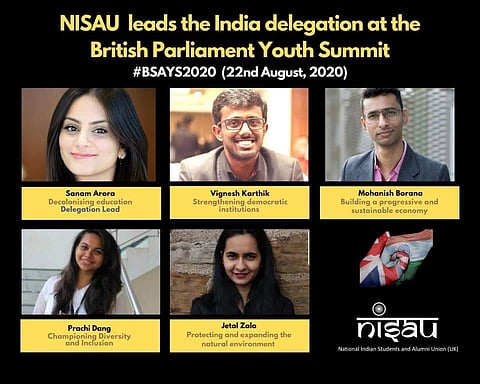

The oldest and one of the largest student bodies in the United Kingdom, the National Indian Students Alumni Union was recently invited to represent India at the inaugural British South Asian Youth Summit held virtually at the British Parliament. The youth of the UK and the South Asian nations signed a historic Memorandum of Understanding at the Summit after discussions on methods to foster understanding and cooperation between the nations.
The delegation from India was led by Sanam Arora, the Chairperson of the NISAU and she was accompanied by Mohanish Borana, the President, Vignesh Karthik, Head of Thought Leadership, Prachi Dang, the Head of Strategic Communication and Jetal Zala, NISAU Sustainability Lead. The session was chaired by Virendra Sharma, Member of UK Parliament and a member of the House of Commons International Development Select Committee. The British Council and the High Commission of India in London besides other political institutions, third sector organisations across the Asian continent and the UK supported the summit. The other countries that were represented were Afghanistan, Bhutan, Bangladesh, Maldives, India and Pakistan.
The delegations discussed topis such as building a progressive, sustainable, inclusive economy, strengthening democratic institutions, protecting and expanding the natural environment, decolonising education and championing diversity, difference and inclusivity. Each group was asked to draft a paragraph to make up part of the Memorandum of Understanding between the nine countries which was then signed at the end of the summit.
Arora said that she was happy that the voice of the youth is being heard that that it was imperative that they have a hand in building their future, “The Black Lives movement has reignited the need to become anti-racist. That starts with what we teach in our history curricula. We call upon the British Government to include greater and balanced teaching of the role played by the British Empire in India and all over the world. Vignesh, another delegate said, “We discussed the role of youth in creating robust public sphere to help spread a new political literacy towards engendering a syncretic institutional and political culture.”
Sharma, at the end of the Summit said that he was highly impressed by the delegates especially since they were all below 31, “As a British MP, but originally from India, I have a perspective on the UK’s relations that differs from the norm. That is why I wanted to bring this group together.”
Some of the parts of the Memorandum are listed below:
Include all perspectives, particularly in history curricula. In Britain in particular, it is imperative that young Britons learn about all aspects of their history. Increase the teaching of the histories of the countries of South Asia in our own curricula. Prioritising decolonisation in order to expand the curriculum and improve both teaching and course content
A sustainable economy is achievable when all members of society are empowered to play active roles. South Asia needs regional collaboration to reduce industrial waste and invest in renewable energy to tackle the adverse effects of climate change.
Taking the fundamental principle of Democracy into account, every individual should be ensured that their vote, voices, opinions matter irrespective of arbitrarily assigned traits through democratic institutions reaching out to minority individuals residing in remote locations via robust campaign structures, technologically empowered convenient voting mechanisms, secure unbiased feedback systems, and expansion of democratic ideal-based knowledge among them.
It is countries that contributed least to climate change will likely feel its effects most, so we need a system that makes sure developed richer nations pay more to prevent climate breakdown. We need more action, not just more words. We need to build international cooperation to create a sustainable food system that maintains our fish stocks, prevents soil erosion, is more organic, stops the use of pesticides and reduces its carbon footprint.
We seek a society in which the law is reformed to ensure all liberation groups are granted equal protection, along with freedom from harassment and a society that not just tolerates but welcomes and treats all fairly and equally. The United Kingdom has an opportunity to offer precedent for south Asian countries to foster inclusive traditions in their policy space and corporate realm.
